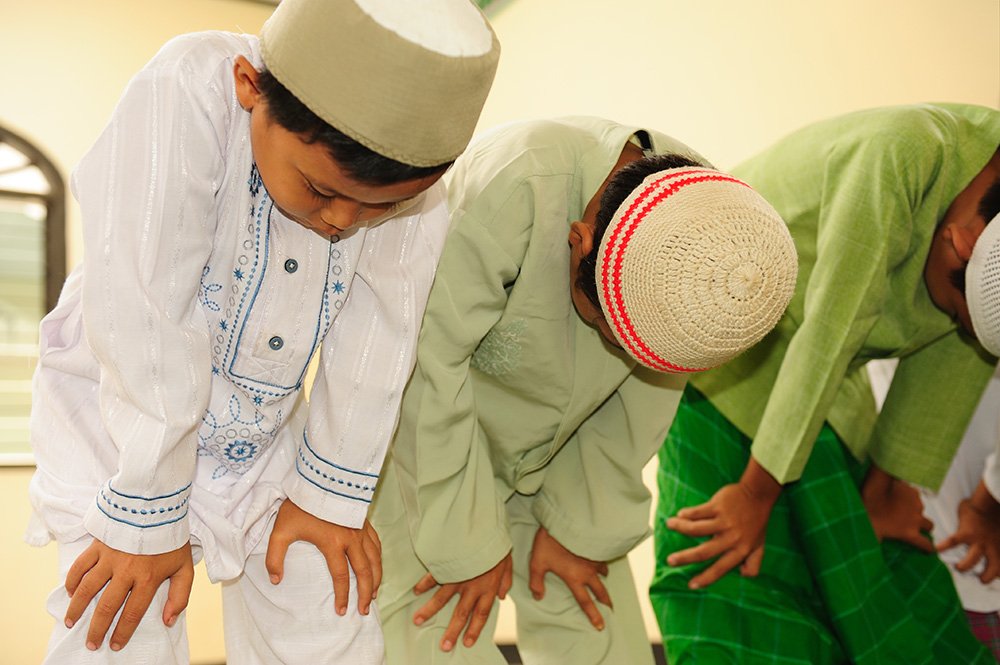Intro
For Muslim children aged 10 to 14, namaz, or prayer, is one of the most important aspects of their faith. Prayer is a direct connection between them and God that helps bring clarity and focus to their lives. It not only serves as a reminder of God’s presence in their lives but also helps them develop self-discipline and patience. Moreover, it can provide a sense of comfort and peace in times of stress and difficulty. In this blog post, we will discuss the importance of namaz for young Muslim kids and how it can help shape their lives.
What is Namaz and why is it important for young Muslim kids?
Namaz, also known as salah, is a form of prayer performed by Muslims around the world. It is a fundamental aspect of the Islamic faith and one of the Five Pillars of Islam. Namaz involves a series of physical movements, including standing, bowing, and prostrating, while reciting verses from the Quran. It is a spiritual act of worship that connects Muslims with Allah, allowing them to express gratitude and seek forgiveness.
For young Muslim kids, offering salah can play a significant role in shaping their spiritual, mental, and physical well-being. Namaz can provide a sense of discipline, focus, and structure to their daily routine. It instills in them a sense of responsibility and helps them understand the importance of time management.
Furthermore, offering salah can also help young kids with their mental health. It provides them with a sense of calmness and serenity, helping to reduce stress and anxiety. Namaz can help them to clear their minds and increase their concentration levels, making them more productive and focused.
In terms of physical health, performing Namaz involves several physical movements, making it a great way to maintain an active lifestyle. The act of standing, bowing, and prostrating provides an opportunity for young kids to stretch and exercise their muscles, keeping them healthy and strong.
Overall, Namaz plays an essential role in the life of young Muslim kids, providing them with numerous benefits for their spiritual, mental, and physical health. Encouraging them to perform Namaz regularly can help them develop a deep connection with Allah and instill in them a strong sense of discipline and focus.
The benefits of Namaz for children’s spiritual, mental, and physical health
Offering salah or Namaz has numerous benefits for young Muslim kids beyond just fulfilling their religious obligations. From enhancing their spiritual connection with Allah to promoting their mental and physical well-being, performing salah can help kids lead healthy and fulfilling life. Let’s explore some of these benefits in more detail.
1. Spiritual benefits.
Namaz offers a direct and personal connection between kids and Allah. Through prayer, children can express their gratitude, seek forgiveness, and seek guidance from Allah. This connection can help them find solace during challenging times and strengthen their faith in Allah.
2. Mental benefits.
Namaz involves a range of physical movements and mental focus, making it an effective tool to reduce stress and anxiety. Kids who offer salah regularly are likely to experience improved concentration, enhanced emotional regulation, and reduced symptoms of anxiety and depression.
3. Physical benefits.
Performing Namaz involves several physical movements, such as standing, bowing, and prostrating, which can improve children’s flexibility, posture, and balance. Additionally, offering salah requires a certain level of physical fitness, which can promote a healthy lifestyle.

Tips for encouraging young kids to perform Namaz regularly
As parents, guardians, or mentors, it’s important to cultivate a love for prayer in young Muslim kids. Here are some tips to encourage them to perform Namaz regularly.
1. Set a good example.
Children often learn by observing their elders. Therefore, make sure you perform Namaz regularly and make it a visible part of your daily routine.
2. Start with small steps.
Don’t expect young children to sit through the entire prayer in the beginning. Start with short prayers and gradually increase the time as they get more comfortable.
3. Create a designated prayer space.
Create a clean, comfortable, and inviting space for children to perform their prayers. This can be a small area in the house or a designated spot in their room.
4. Use visual aids.
Children respond well to visual aids, and they can help to make the prayer experience more enjoyable and engaging. You can use colorful prayer mats, Islamic art, or books to help children understand the significance of Namaz.
5. Make it fun.
Encourage children to memorize the different steps of prayer, recite different duas, and offer prayers in congregation with family and friends. This can help to create a positive association with prayer in their minds.
6. Be patient.
Encouraging children to perform Namaz regularly is a long-term process, and it’s essential to be patient and understanding. Do not force them to pray or scold them if they miss a prayer, instead gently remind them and encourage them to continue.
By following these tips, you can create a positive environment that encourages young Muslim kids to develop a regular prayer routine that will serve as a source of spiritual guidance and strength throughout their lives.
Common misconceptions about Namaz and how to overcome them?
Namaz, also known as Salah, is an essential part of a Muslim’s life. Unfortunately, there are many misconceptions about Namaz, especially among young children. Here are some of the most common misconceptions and how to overcome them.
1. Namaz is only for adults.
Many young children think that Namaz is only for adults and not relevant to their lives. However, Namaz is a crucial part of a child’s spiritual development. Children should be taught that Namaz is an act of worship that benefits people of all ages.
2. Namaz is too difficult.
Some children may feel overwhelmed by the thought of praying five times a day. Parents can make it easier for their children by breaking down the prayer into smaller, more manageable parts. For example, start with one prayer a day and gradually increase the frequency over time.
3. Namaz is boring.
It’s common for children to think that Namaz is boring, but this is far from the truth. Namaz provides a peaceful and calming atmosphere for the mind and soul. Parents can make the experience more enjoyable by including children in the process. Encourage them to choose a spot to pray or allow them to select their favorite surahs to recite during Namaz.
4. Namaz is only recitation.
Children may think that Namaz is simply a matter of reciting verses from the Quran. While recitation is an important part of Namaz, children should also be taught about the various postures and actions that make up the prayer. This includes standing, bowing, prostrating, and sitting.
Stories of young Muslim kids who have found solace and guidance through Namaz

Namaz can be a powerful tool for young Muslim kids to connect with their faith and find solace and guidance in their daily lives. Here are some stories of young Muslim kids who have found a deep sense of comfort and support through their daily practice of Namaz.
1. Ahmed, a 12-year-old from Dubai, had always struggled with anxiety and stress. However, since he started praying regularly, he noticed that his worries seemed to fade away and he felt a greater sense of calm and peace in his daily life.
2. Aisha, a 10-year-old from Pakistan, used to struggle with feelings of loneliness and isolation. However, since she started praying five times a day, she felt a greater sense of connection with Allah and a deep sense of belonging to her faith community.
3. Mohammed, a 14-year-old from Malaysia, had been struggling with his school grades and felt like he couldn’t keep up with his classmates. However, since he started praying regularly, he found a renewed sense of motivation and focus in his studies and was able to improve his grades significantly.
These stories are just a few examples of the profound impact that Namaz can have on young Muslim kids. By encouraging children to embrace the practice of prayer and helping them to understand its importance and benefits, parents and educators can help nurture the spiritual, mental, and physical health of the next generation of Muslim youth.

